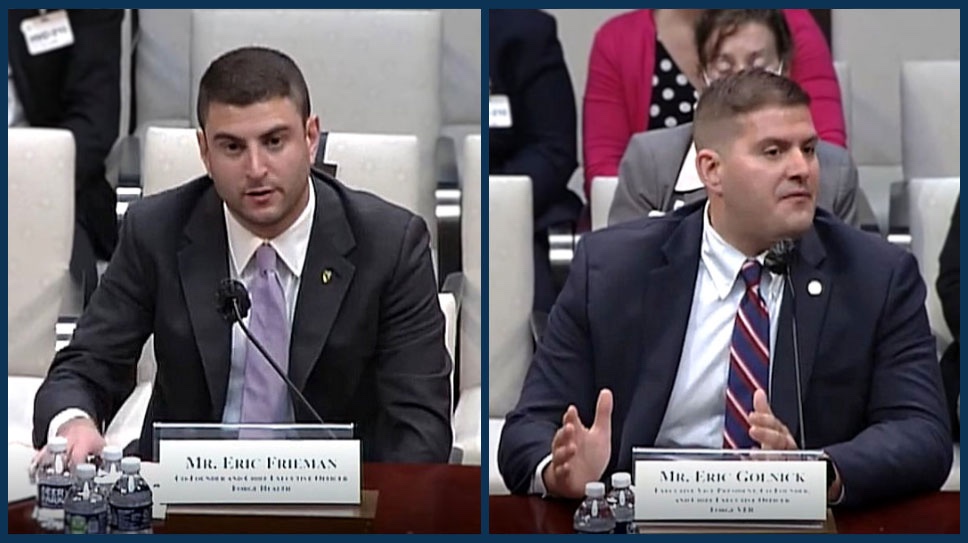Last Thursday, the House Committee on Veterans Affairs Subcommittee on Health invited Forge Health leadership to provide expert testimony on obstacles to the effective use of community care resources in treating mental health and substance use among veterans. The goal of the hearing was to better understand how well the Veterans Affairs’ Maintaining Internal Systems and Strengthening Integrated Outside Networks Act of 2018 (VA MISSION Act), which established a new Veterans Community Care Program, is functioning.
Implemented in June 2019, the VA MISSION Act is intended to strengthen the nationwide VA Health Care System by providing veterans with more health care options. Under its provisions, veterans can choose to receive care from the VA or elect to get treatment in the community, if they meet certain eligibility criteria. Chairwoman Julia Brownley (D-CA) observed, however, that much more needs to be done to meet the goals of that legislation. “My colleagues and I regularly hear from veterans that they are still experiencing significant delays in receiving community care referrals,” she said. “We hear all the time from veterans who have waited weeks or even months for community care appointments to be scheduled.”
Co-founder and CEO of Forge Health Eric Frieman opened his testimony by praising the VA MISSION Act, but noted that effective execution remains lacking. “The VA MISSION Act was an incredibly important step forward for our veterans, but it is only as valuable as its implementation. Until it is implemented as intended, veterans will continue to suffer unnecessarily long wait times… and in too many cases, will die as a result,” he said.
Frieman drove home the critical nature of removing roadblocks to community care using the experience of his brother, a former captain in the Army, as an example. “My brother, a U.S. Army veteran, has lost more soldiers to suicide and alcohol- and drug-related deaths than he did in two combat zones,” Frieman recounted. “That statistic is devastating and unacceptable.”
Eric Golnick, co-founder of Forge Health and CEO of Forge VFR, which provides specialized mental health and substance use treatment to veterans and first responders, emphasized how important it is to get those seeking care into treatment as quickly as possible. “As a veteran who has been through this journey myself, you’ve got a very short window. You’ve got about 48 hours to get them in there,” said Golnick. He continued, “There is a large correlation between substance use issues and suicidality. So, it is urgent because people are going to die if we don’t get them into treatment fast.”
Subcommittee members asked if there were specific suggestions Forge Health would make to improve the implementation of the VA MISSION Act. Frieman responded that there a number of opportunities, but cited being able to back-date care to the beginning of treatment, as opposed to the date of VA approval for treatment, as particularly worthwhile. Golnick, in turn, suggested that providing guidance on substance use and mental health to men and women as they are discharged from the armed forces would have a significant impact in reducing stigma and encouraging people to get the help they need.
Subcommittee Ranking Member Jack Bergman (R-MI), himself a retired Marine Corps general, praised the partnership between the VA and Forge Health, and referenced the company’s recent groundbreaking clinical outcome study: “Opponents of community health care will tell you that non-VA providers lack the cultural competency to care for the unique needs of those who’ve served. Forge Health is veteran-owned and has a deep understanding of the meaning and impact of military service. Opponents of community care will tell you that it’s just a back door to privatization on the part of those who want to do away with the VA health care system altogether. That’s just simply not true. Forge Health believes like I do that community care only makes VA stronger and better able to provide the care that veterans require. Opponents of community care will tell you outcomes in the community are much worse than in the VA. Forge Health is a VA community care provider and partner, and they have the data to prove that when VA works hand-in-hand with community providers, outcomes improve and veterans benefit.”
Subcommittee leadership asked if Forge Health would be willing to partner with the VA and Congress on ways to improve veteran access to community care, and Golnick’s reply was to the point: “Absolutely.” As testimony concluded, Frieman noted that the hearing had been a positive step forward: “This has been fantastic, and for us, incredibly encouraging. It’s not easy to implement something like the VA MISSION Act, and so having conversations like this is critical.”
Chairwoman Brownley concluded the hearing by saying, “We’ve got to find the right balance between services from the VA and services from the community… It gives me greater confidence that there are organizations like [Forge Health] out there doing really, really good work, because the VA can’t do it alone – we’re all in this together.”
Afterwards, Frieman amplified his remarks, saying “It was such an incredible honor to testify before Congress today. Forge Health is leading the charge in driving innovation, improving care delivery, and shaping the future of behavioral health care to ensure that accessible, affordable, and effective mental health and substance use treatment is available for all. We look forward to working with the House Veterans Affairs Committee and the VA on ensuring that our veterans and their families have access to the highest-quality mental health and substance use care when they need it.”
Rep. Julia Brownley, Chairwoman of the House Committee on Veterans Affairs Subcommittee on Health, provides closing remarks and thanks Forge Health leadership for providing expert testimony.


